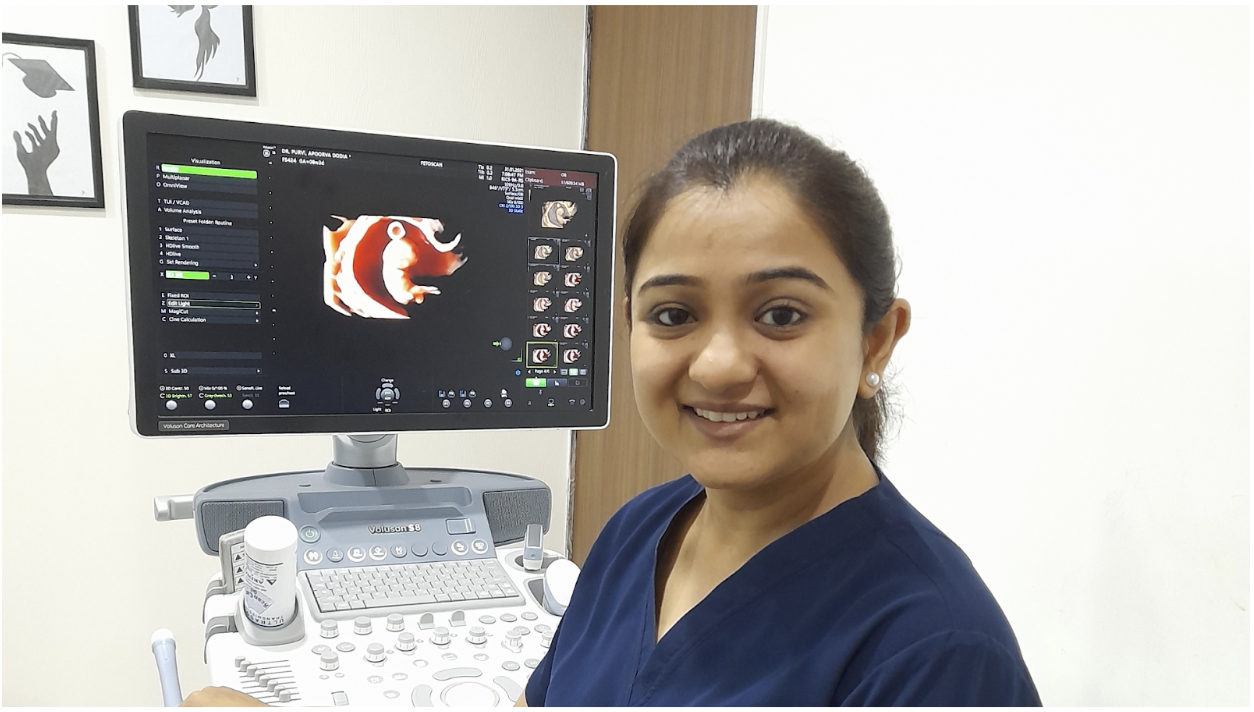Fetal medicine is a branch of medicine that specializes in complete fetal care, monitoring the baby and mother’s health during the pregnancy. Fetal medicine specialists are exclusively trained to focus on high-risk pregnancies and have extensive knowledge of medical, surgical, and genetic complications that may arise during pregnancy.
“Fetal medicine specialists monitor the baby and mother’s health during the pregnancy.”
Every pregnancy is unique, and understanding that journey is imperative to the mother’s and the baby’s well-being. With ultrasound scanning by fetal medicine specialists, maternal and fetal mortality can be reduced, and anomalies can be picked up in the early stages of pregnancy.
What are the different services offered at Fetoscan?
- Pregnancy scan
- First trimester combined screening test
- Anomaly scans
- Fetal Echo
- Twin surveillance scan
- Fetal diagnostic interventions
- Chorionic villus sampling
- Amniocentesis
- Fetal blood sampling
- Therapeutic interventions
- Multifetal pregnancy reduction
- Direct fetal blood transfusion
- Tumor embolisation
- Shunts
- Genetics
- Down syndrome screening
What are scans required for every pregnancy?
- First-trimester screening at three months
- Anomaly scan / TIFFA at five months
- Interval growth scan at eight months
There may be additional scans depending on various factors. The ultrasound scan at all stages of your pregnancy will be able to detect anomalies, if present, average estimated fetal weight, and growth of your baby. Your doctor will track the speed with which your baby is growing over a growth graph chart.
Are pregnancy scans harmful to your baby?
The scans are not harmful to the baby or the mother. One of the primary objectives of a fetal scan is to assess the fetus’s structural normalcy and identify the nature and prognosis of any fetal defects detectable on ultrasonography.
What is First-trimester screening?
The first-trimester screening (FTS) is the combination of fetal ultrasound examination done at 11-14 weeks and maternal blood test for Down syndrome screening. It is also referred to by different names: Combined Screening Test (indicating a combination of scan and blood), NT scan test. While assessing the structural normalcy of the fetus at the 11 – 14 weeks scan, a detailed protocol is undertaken, including fetal body parts, structural milestones, placenta, and liquor.
Why is FETAL DIAGNOSTIC INTERVENTION done?
Fetal diagnostic interventions help the doctor test for certain fetal disorders. A few genetic disorders are passed down from parents, which can be detected early with fetal diagnostics and give the parents an option to make informed decisions for the fetus.
What is Chorionic Villus Sampling?
Chorionic villus sampling (CVS) is a procedure that involves procuring a tiny bit of the mother’s placental tissue. This is done by inserting a needle through the mother’s abdomen and womb and into the developing placenta – under the guidance of ultrasound. The most common indication for performing CVS is to rule out Down syndrome: this may be because there was a previous child with Down Syndrome, advanced maternal age is above 35 years, or the screening test showed a high chance for Down Syndrome.
What is Down syndrome?
Typically humans have 46 chromosomes in their cells. Instead, if there are 47 chromosomes (due to an extra copy of the 21 chromosomes), Down syndrome occurs. These children may have a variable degree of intellectual challenges, heart and intestine problems, and other health issues.
What is Amniocentesis?
Amniocentesis is a procedure to obtain a small amount of amniotic fluid (about 20mL) by inserting a needle through the mother’s abdomen and into the womb. The needle will always be under ultrasound guidance to not harm the fetus. The reasons for performing an amniocentesis test are essentially the same as for doing a chorionic villus sampling. The amniocentesis test is done between 15-20 weeks.
When is Fetal Blood Sampling Required?
In certain situations, testing the fetal blood directly is required. Commonly, when hydrops accumulate fluid inside the fetus, fetal blood sampling is necessary to find out the cause. In other situations, the reasons for testing are similar to chorionic villus sampling or amniocentesis. Generally, when testing has to be done beyond 20 weeks, FBS is preferred over amniocentesis.
Are there any Fetal medicine experts in India?
Dr. Aparna V Dodia, Director of FETOSCAN, holds an MBBS and MD in Radio Diagnosis. She is fiercely passionate about fetal care and its continued improvement. Her Center of excellence is a testimony to her passion for fetal medicine and a platform for creating awareness of prenatal screening.
Contact Number: +919979271521
Email: [email protected]
Timings: 9:00 am – 8:00 pm ( Mon – Sat)
Website: https://fetoscan.in/
Fetal medicine is still new to our country, which means there are many skeptics. If you are expecting, you must consult your Fetal medicine doctor for thorough fetal care- early diagnosis can save lives. This article has only touched upon the various services available under fetal medicine. Learn more here: https://fetoscan.in/services/





